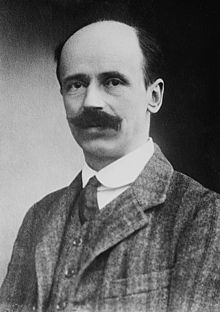|
István Bethlen
Count István Bethlen de Bethlen (8 October 1874 – 5 October 1946) was a Hungarian aristocrat and statesman and served as prime minister from 1921 to 1931. Early lifeThe scion of an old Bethlen de Bethlen noble family from Transylvania, he was the only son of Count Istvan Bethlen de Bethlen (1831–1881) and Countess Ilona Teleki de Szék (1849–1914). He had two elder sisters: Countess Klementine Mikes de Zabola (1871–1954) and Countess Ilona Haller de Hallerkeö (1872–1924). CareerBethlen was elected to the Hungarian Parliament as a liberal in 1901.[1] Later, he served as a representative of the new Hungarian government at the Paris Peace Conference in 1919. In that year, the weak centrist Hungarian government collapsed and was soon replaced by the communist Hungarian Soviet Republic, under the leadership of Béla Kun. Bethlen quickly returned to Hungary to assume leadership of the anti-communist "white" government, based in Szeged, along with former Austro-Hungarian Navy Admiral Miklós Horthy. After the "white" forces had seized control of Hungary, Horthy was appointed Regent of Hungary. Bethlen again took a seat in the Hungarian Parliament and allied with the conservative factions there. In 1919, Bethlen rejected a personal union between Romania and Hungary under the King of Romania.[2][3] After the attempted return of King Charles IV to the throne of Hungary in 1921, Horthy asked Bethlen to form a strong government to eliminate the possibility of other such threats to the new country. Bethlen founded the Party of National Unity. He was also able to unite the two most powerful factors in Hungarian society, the wealthy primarily-Jewish industrialists in Budapest and the old Magyar gentry in rural Hungary, into a lasting coalition. That effectively checked the rise of fascism in the country for at least a decade. Bethlen reached an accord with the labour unions, earned their support for the government and eliminated a source of domestic dissent. During the May 1926 trial of the Franc affair plotters, Bethlen was called to testify over his involvement in it.[4] French Prime Minister Aristide Briand used the scandal by pushing for Bethlen's removal from power and his replacement by a more liberal politician.[5] The plot centred on the efforts of Hungarian nationalists to damage the French economy by disseminating forged 1,000 French franc banknotes. Several plotters provided incriminating evidence of Bethlen's involvement, but he managed to cover up his role by exercising direct control over the proceedings.[4][6][7] Facing considerable public pressure, Bethlen offered his resignation to Horthy, who refused to accept it.[8] Bethlen subsequently shuffled his cabinet by replacing Interior Minister Iván Rakovszky.[6] The outcome of the trials, in fact, increased Bethlen's popularity in Hungary.[9]  During his decade in office, Bethlen led Hungary into the League of Nations,[10] arranged a close alliance with Fascist Italy and even entered into a Treaty of Friendship with Italy in 1927 to further his nation's revisionist hopes.[11] He was defeated in his attempts to change the Treaty of Trianon, which had stripped Hungary of most of its territory after the First World War. The Great Depression shifted Hungarian politics to the extreme right, and Horthy replaced Bethlen with Count Gyula Károlyi de Nagykároly,[12] which was followed quickly by Gyula Gömbös de Jákfa, a noted fascist and antisemite. Increasingly shunted into political obscurity, Bethlen stood out as one of the few voices in Hungary to be actively opposed to an alliance with Nazi Germany. As it became apparent that Germany was going to lose the Second World War, Bethlen attempted to negotiate a separate peace with the Allied powers. By the spring of 1945, most of Hungary had fallen to the advancing Soviet troops. The communists, who returned with the Soviets, immediately began their scheme to take over the country. They saw the aging Bethlen as a threat, a man who could unite the political forces against them. That made the Soviets arrest in March 1945. Soon afterward, Bethlen was taken to Moscow,[13] where he died in prison on 5 October 1946.[14]  Personal lifeOn 27 June 1901, he married his distant cousin, the author Countess Margarete Bethlen de Bethlen (1882–1970). They had 3 sons:
Notes
References
External links
|
||||||||||||||||||||||||||||||||||||||||||||||||||||||

